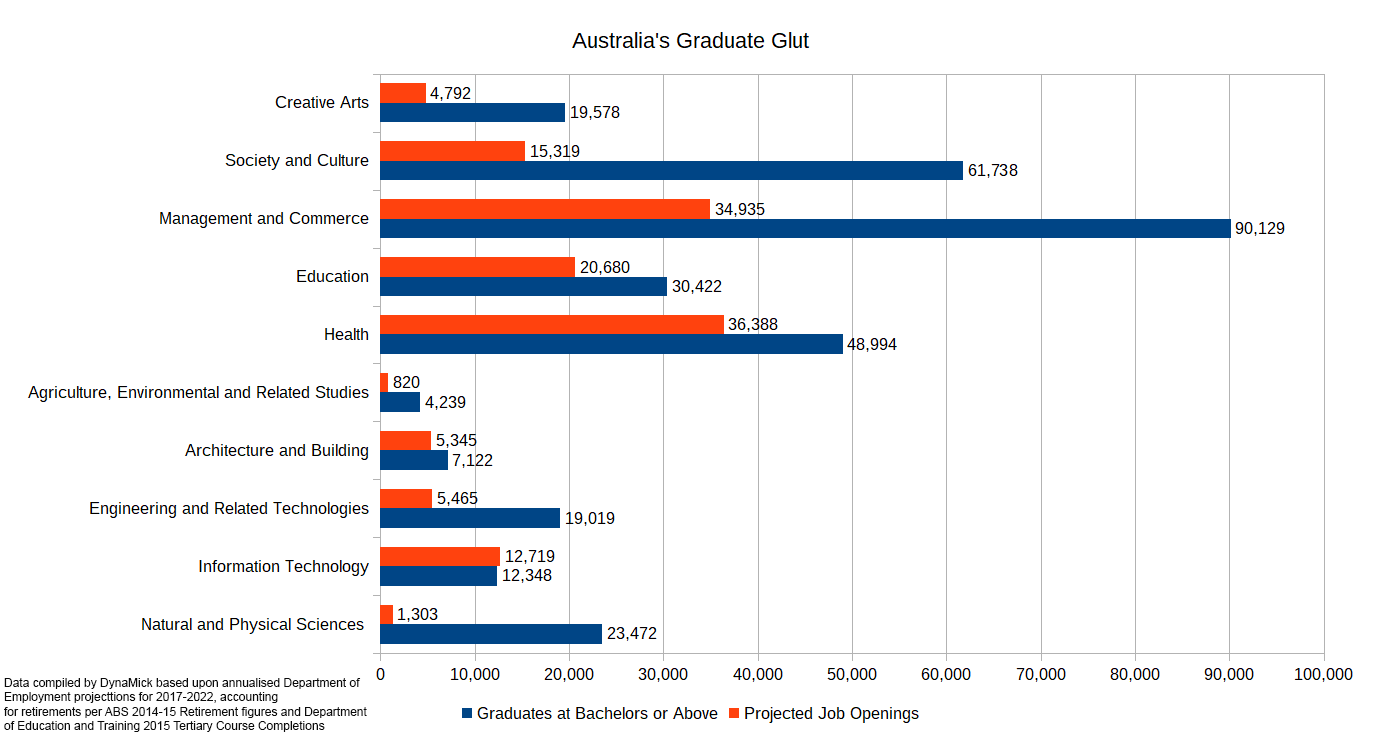Deregulation of university places by the Gillard government has left a legacy of massive graduate oversupply. The chart above makes for stark reading, with many more graduates than jobs available for them in every field except IT, much like the situation in the US. The much vaunted STEM field, which Australia’s Chief Scientist declared should be “at the core of almost every agenda” is revealed to be a hollow wasteland, with 18 graduates for every job in the maths and sciences. The supposedly “always in demand” engineering sector provides a similar employment proposition to the much derided creative arts stream. Without jobs in their area of study, graduates in SEM will be forced outside it in order to find work, if indeed they can find skilled work at all given the depths of the oversupply. So how did we get here, and why is STEM still lionised as a cure-all to employability?
First, our worship of technology and the businessmen who market it has led to them exerting an outsized influence on public policy. Celebrity businessmen like Tim Cook, Bill Gates, Mark Zuckerberg and more locally the Atlassian boys all use their pulpit to advocate more emphasis on STEM in education. Corporate mouthpieces, recruiters, universities and even spineless sellout professional associations all laud STEM as an area in desperate need of more workers. Applying an ounce of critical thinking, it is clear that all these folks benefit from an oversupply, their companies get to pay less for labour, the universities and associations get more members paying for their services. Yet somehow this ounce of critical thinking is not applied, and the narrative continues unchallenged. Encouraging more IT workers to fill those positions whch are available is clearly one aspect of this offensive. But this insistance on the whole of STEM (rather than just the T with job prospects) helps to camouflage the naked self-interest at play, as well as to destroy the traditional position of these folks as a labour aristocracy. I assert however that the oversupply across these technical areas has another, more ideological motivator as well.
The engineering education is a near perfect mechanism for moulding a worker who is capable of adapting to new technologies, but lacks the critical and broader systemic thinking which often leads to the assertion of workers rights or questioning the status quo. The technical education favoured in developing engineers teaches students how to apply various formulas for particular analyses without ever questioning the underlying assumptions. This combines with a godhood complex cultivated by the traditional labour aristocracy narrative to lead engineers towards technocratic, right wing politics. This comes with an aversion to critical thinking which helps the engineer swallow propaganda and prevents unionisation. The complete avoidance of social science and the humanities in this kind of education also helps avoid any emancipatory ideas from coming into the engineer’s head. In short, the engineer is the perfect worker-drone. I should know, I trained as one! Scientific or mathematical educations tend to provide more training in critical thinking, but the complete dearth of job opportunities outside academia ensures that these folks will be ready to retrain as data scientists, programmers or in other IT fields at deflated salaries.
The irony is that this glut can be traced back to a centre-left government trying to improve equality, but the oversupply of graduates has meant that the networking and familial contacts developed by the bourgeousie are more important than ever. The obsession with education as a panacea for society’s ills can be traced back to the originators of the Third Way, who sold out their labour traditions in favour of centrist measures aimed at electability. This particularly pernicious emphasis on education rather than improving equality can be seen as a constant throughout the recent Labour party’s perscriptions, and in fact originated with former leader and now alt-right provocateur Mark Latham. Latham built his position on the basis that “an information society breaks down all forms of hierarchy” (per his essay In Defence of the Third Way, 2001), an orthodoxy which the current Labor Party still clings to despite the new tech monopolies only serving to strengthen those self-same hierarchies.
So where do we go to from here? A more educated populace is self-evidently a good thing, and in any case pushing the poor out of universities by recapping places won’t put the genie back in the bottle. The problem is on the employment end – we need to create enough jobs which utilise the skills of our youth. Projections show 350,000 jobs being created per year, enough to absorb all our graduates and then some. But the majority of these do not require an education, leading to the shortfall we currently see. With our current system, many of these simple jobs will end up being filled by overqualified candidates, like those in Aldi and Flight Centre‘s graduate programs to train scientists into customer servants. A re-orientation towards a more well rounded education is required, but our neo-Taylorist systems work to minimise the opportunities for a creative worker to express their talents.
A renewed role for government in research and development would be a good start towards putting those bright minds to use, but not sufficient. With the near wholesale education of our workforce, why not put their learned skills to work? There is much work to be done, whether in transitioning to sustainable energy, fundamental scientific research, further societal education, automation or even in devising alternate visions for society. We’d need skills beyond SEM for this, but luckily we also have plenty of spare talents in across areas. We have a well educated, capable, cross-disciplinary surplus of skilled young dreamers who aren’t needed for stacking shelves or telemarketing, so why not fund them to better society? The Department for a Better World can start by developing a plan which cracks down on corporate tax evasion to provide the seed funds.

